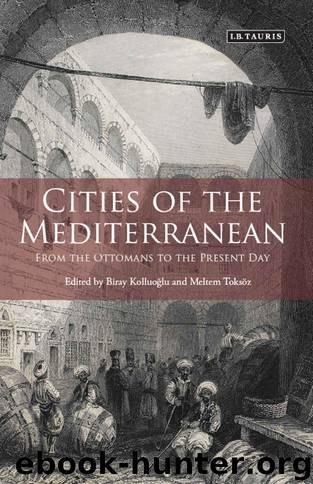Cities of the Mediterranean: From the Ottomans to the Present Day (Library of Ottoman Studies) by Biray Kolluoğlu and Meltem Toksöz

Author:Biray Kolluoğlu and Meltem Toksöz
Language: eng
Format: azw3
Publisher: I.B.Tauris
Published: 2014-08-25T04:00:00+00:00
Management of Land Resources: The Mirdita Forest
Ottoman redistribution policies especially targeted under-used forests and pastures in Mirdita. Labeled as uninhabited and thus categorized as terra nullius, local state authorities who were eyeing valuable forest land historically under the protection of Prenk bib Doda Pasha, a long-time thorn in the side of the sultan, were able to place legally binding claims to common land and redistribute it as they saw fit.28 That the concept of terra nullius (mevat in Ottoman) did not really work on the Balkans becomes clear with the European powers’ subsequent attempt to rationalize their expansion into Mirdita at the expense of the Ottoman Empire in the 1890s. Local resistance to the efforts of the Ottoman state (and at times outside powers) to consolidate influence over local affairs resulted in the modified application of imperial institutions. This adjustment included the expulsion of Prenk bib Doda Pasha to Lebanon. It is important to note here that no single policy of the Sublime Porte could actually be sustained in these regions without the help of the local elites. This left locally based officials to deal with the fact that no policy was sustainable in their area of responsibility without the cooperation of Prenk bib Doda Pasha, who ironically was now located in Lebanon. In the end, it was the local subject who even in exile was the focus of imperial power, creating a new set of opportunities for a growing number of players in regional events and strengthening the influence of many who in the past had been targeted for marginalization.
The forested hinterland that served as a vital zone of confrontation between Ottoman and local aspirations also played a central role in the wider Mediterranean economy. Now linked by better roads and connected by bridges that spanned the many rivers and streams of the Albanian highlands, the domain of Prenk bib Doda Pasha started to draw the attention of European investors. What began to happen on the frontiers of Ottoman Albania was a transformation by integration, one in which European interests in the land’s natural resources once again introduced a force of change, much in the same way as the influx of expelled Albanians transformed the period between 1878 and 1880. The interplay between various commercial interests and those who had access to much of the region’s resources, and especially its forests, became a complex story essential to appreciating the underlying socio-economic dynamics of empire in the modern era. Tensions over land use, claims of ownership and state favoritism produced a hostile mix of expropriation, animosity towards non-locals, clashes over limited resources, and conflicting notions of the land’s value.
The forest, much like the pastures and water sources, represented to locals a fragile commodity that required protection from foreign intrusions, not only for the sake of preserving territorial integrity, but also as part of a long tradition of safeguarding the community’s power. In the period under study, the excess cutting of trees by resettled refugees was often resisted because of the well-understood impact that unmanaged deforestation has on the topsoil.
Download
This site does not store any files on its server. We only index and link to content provided by other sites. Please contact the content providers to delete copyright contents if any and email us, we'll remove relevant links or contents immediately.
Aircraft Design of WWII: A Sketchbook by Lockheed Aircraft Corporation(31788)
The Great Music City by Andrea Baker(21961)
Call Me by Your Name by André Aciman(19012)
The Art of Boudoir Photography: How to Create Stunning Photographs of Women by Christa Meola(17870)
Shoot Sexy by Ryan Armbrust(17160)
The Secret History by Donna Tartt(16698)
Plagued by Fire by Paul Hendrickson(16648)
Portrait Mastery in Black & White: Learn the Signature Style of a Legendary Photographer by Tim Kelly(16498)
Adobe Camera Raw For Digital Photographers Only by Rob Sheppard(16408)
Photographically Speaking: A Deeper Look at Creating Stronger Images (Eva Spring's Library) by David duChemin(16174)
Bombshells: Glamour Girls of a Lifetime by Sullivan Steve(13130)
Pimp by Iceberg Slim(12962)
Ready Player One by Cline Ernest(12887)
The Goal (Off-Campus #4) by Elle Kennedy(12468)
Art Nude Photography Explained: How to Photograph and Understand Great Art Nude Images by Simon Walden(12372)
Kathy Andrews Collection by Kathy Andrews(10573)
Thirteen Reasons Why by Jay Asher(7817)
Wonder by R.J. Palacio(7757)
Goodbye, Things by Fumio Sasaki(7754)
